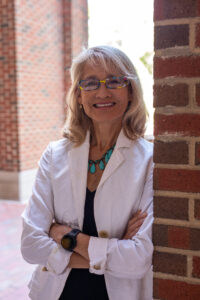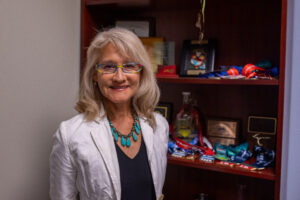News & Stories
Lessons in resiliency

A balance beam is just 4 inches wide, 4 feet tall and 16 feet long.
For as long as a minute and a half, gymnasts leap into a split over the beam, hoping to land without the slightest wobble or extra hop. They move forward and backward with acrobatic artistry, and perform handstands, backward flips and graceful poses.
And if they fall off the beam, they have just 10 seconds to get back up to continue or their time competing is over.
The beam was one of Professor Ivonne Chirino-Klevans’ favorite events when she was an elite athlete on Mexico’s national gymnastics team.
She wanted to be challenged. She didn’t mind the nerves or fear; she welcomed the chance to show herself that she was strong enough to move past it all.
When Chirino-Klevans fell, she always got back up.
“It doesn’t matter how many difficulties there are. I’m going to find a way to get things done,” she says. “I always believe in setting goals that take you out of your comfort zone. Something I would not do is curl up in a ball, give up and cry. You get on with the thing.”

It’s an attitude that informs Chirino-Klevans’ classes as an organizational behavior professor at UNC Kenan-Flagler Business School. Her courses, primarily for MBA students, focus on effective leadership and decision-making, and leading diverse and equitable organizations.
As a coach and business consultant for decades, Chirino-Klevans has worked with executives across industries that face many of the same obstacles as professional athletes: keeping cool under pressure, learning from failure, managing emotions and motivating others.
She asks students to take an honest look at themselves and embrace their strengths and weaknesses as future leaders. Like the best business leaders, Chirino-Klevans is empathetic but at the same time sets high expectations.
“Anybody can be a leader,” she says. “But they need to want it — actually want it. They have to put the energy into developing those skills. They have to listen to opposing views. They need a level of self-awareness. And when they fail, they have to get up.”
Renaissance woman
Chirino-Klevans’ resume is one surprise after another.
From Mexico City, she began gymnastics at 7 years old and at 14 competed internationally as a member of Mexico’s national gymnastics team. She holds bachelor’s, master’s and doctoral degrees in psychology from Georgia College and State University and an MBA from Universidad de las Américas, A.C. in Mexico City.
As a sports psychologist early in her career, she worked extensively with Olympic athletes to improve their performance and lean into their mental toughness.
In the early 1990s, Chirino-Klevans developed a leadership development simulation using artificial intelligence and later worked on a virtual reality simulation for executives to master cross-cultural business skills.
She’s authored several books on leadership, including “Cases on Global Leadership in the Contemporary Economy.” She has volunteered with Líder, a UNC-based leadership development program for Latinx undergraduate students in North Carolina. She has held academic leadership positions at Duke University and NC State University, guest lectures at the International School of Management in Paris and is a consultant for NASCAR.
In 2022, she received a Distinguished Mexican award by Claudia Velasco-Osorio, the consul general to Mexico in Raleigh, North Carolina, for her societal impact and extraordinary professional career.
“My career is not straightforward. It’s definitely different,” she says. “But the common thread is hard work. And I’m always curious. I’m always willing to learn, and I learn a lot from my students.”
Chirino-Klevans is a teacher who’s teachable, a coach who’s coachable. At the beginning of a class, she gives students a questionnaire. One question: “Is there something that you think I should know about you?”
Students write about going through difficult situations and recovering from trauma. Others share how wonderfully they are doing at work or about their passion for entrepreneurship. She wants to not just know her students but understand them and learn from them.
She offers support and mentorship, but ultimately, she wants each of her students to find their unique strengths on their own. In those written reflections, Chirino-Klevans gets a window into her students’ unique decision-making styles and who they really want to be as leaders.
“When my students write about themselves in a leadership course, I get a perspective that not a lot of people get to see,” she says. “I want to be the one who helps them realize that there is light out there, that things eventually work out well. I want to be the person who gives them hope, who can open those doors for them.”

Standing tall
In 2022, Chirino-Klevans’ orthopedist told her that she had overused the cartilage in her ankles and recommended that she stop running.
It was a blow to her spirit, but she picked herself up. She decided to try racewalking — and set a new goal.
She wanted to compete at the Pan-American Masters Games again, the first since she competed as a teenage gymnast representing Mexico. This time, she represented the United States and won silver and bronze medals in racewalking. A month later, her team won the silver medal in 10-kilometer racewalking at the World Masters Athletics Championship in Sweden.
“This experience has reinforced my belief in the importance of effective teamwork and its impact on achieving success,” she shared on LinkedIn. “My teammates had been my rivals for the past year competing in nationals. When we created a team to compete in the world championships, we had a shared goal. Each other’s success had an impact on all of us.”
In the same way, Chirino-Klevans cheers on her students in and out of the classroom; she considers herself successful when they succeed.
“Our students have put in a lot of hard work. They have been successful. It’s hard for them at the beginning to accept that they can be effective leaders, still experience failures, and that is OK,” she says. “What’s most important is that they think about what they can do differently next time.
“They learn how to get up.”